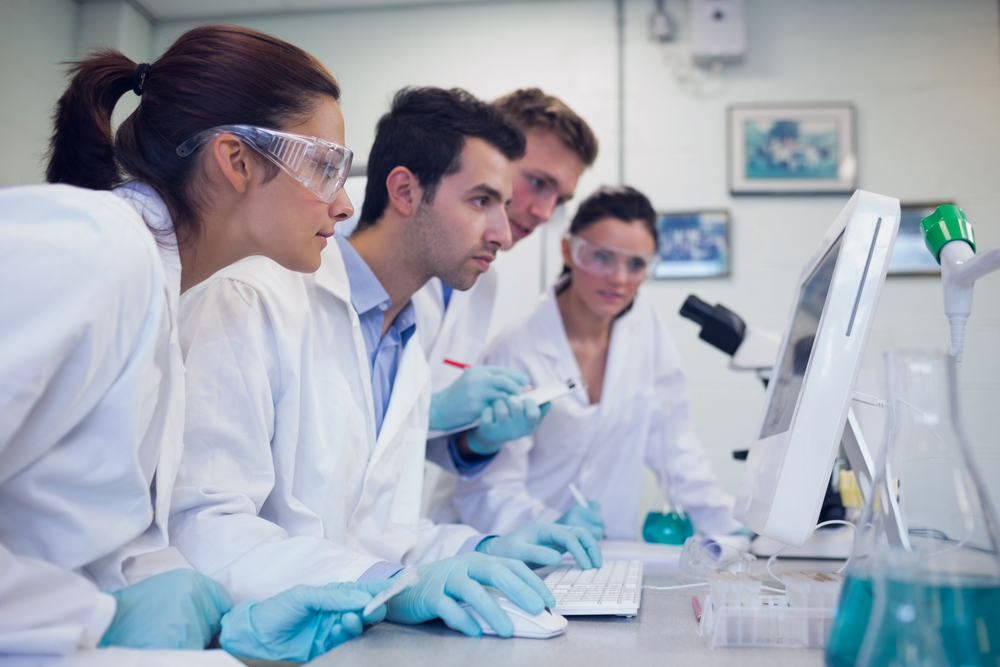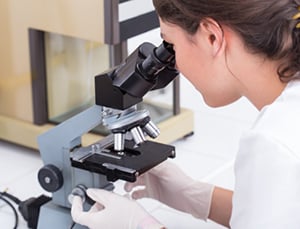Michael Heer is a football fan, whether he’s rooting for the Oregon Ducks with his family or coaching his sons on the field. What makes these moments even more special is that 10 years ago, on his 38th birthday, Michael learned he had cancer.
“We had two small children at the time, and my wife, Alicia, was eight months pregnant with our third child. It was quite a shock,” Michael says.
Diagnosed with chronic lymphocytic leukemia (CLL), the most common form of leukemia in adults, Michael was told that his type of cancer is typically slow-growing, and that he may not require treatment for years. But a year and a half after his diagnosis, it became clear that treatment was warranted.
“The first treatments I received were standard chemotherapy, because that’s all that was available at the time,” Michael says. “Unfortunately, that didn’t work very long, so there was a need to find something else. That’s when I started participating in clinical trials.”
Clinical research trials
Clinical trials are the centerpiece for the drug-testing system in the United States. Each cancer study tries to answer scientific questions and determine better ways to prevent, diagnose or treat the disease.
“The average cancer cell harbors between 80-100 mutations. And that’s really the interplay that, unfortunately, causes these cells to be able to break the rules, make too many copies of themselves and then start to invade tissue, where they don’t belong,” says medical oncologist Dr. Christopher Yasenchak.
Dr. Yasenchak says today’s clinical trials are revealing much more about individual cancer cells—what makes them change and grow and how to shut them down; however, less than five percent of eligible adult cancer patients participate in trials.
“We’re hoping to increase those numbers, because that is how we’re going to make progress,” he says. “That is how we’re going to find more effective treatments with fewer toxicities and a better chance of a cure. And we can do that, all right here in our community, which is exciting.”
The first trial Michael participated in at OHSU did not work for him, but the second investigational trial at WVCI, studying a combination therapy involving the drug idelalisib, was highly successful against his cancer. That drug is one of eight new agents to earn FDA approval for the treatment of CLL within the last decade.
Clinical trials are not available to every patient and don’t work for everyone, but for many patients, including Michael, participating in a research trial has dramatically changed their prognosis and their outcome.
“What they’re doing through these clinical trials is getting closer to figuring out a cure, or at least treatments that are going to hold the cancer at bay,” Michael says.
Parenting through cancer
Cancer can be physically and emotionally exhausting, even more so when children are involved. Michael says one of the hardest parts of living with the disease is trying to help his kids understand what cancer is and how it affects him.
“When I was first diagnosed, they were babies, so there was no way to explain to them what it was. We were honest, but we only gave them as much information as they could handle,” he says. “Now, that they’re older, they ask questions. We take them to a lot of appointments with us so they see the process, see what I’m going through and not have to wonder.”
Unfortunately, unlike football, there’s no playbook to follow when a parent has cancer. And there have been some tough moments, like when Michael’s oldest son, Carter, who was about 8-years-old at the time, informed him that he never wanted to become a father, because he didn’t want to get cancer.
“I realized, in that moment, that Alicia and I hadn’t taught him enough or told him enough. It was an opportunity for me to sit down with him and explain that I didn’t get this because of him,” Michael says. “Kids unfortunately don’t understand that. And sometimes you miss telling them things, and you don’t realize it until it comes back later. That moment allowed me to understand that we hadn’t given him enough knowledge. It’s a constant evolution, to teach them not only what cancer is but what living with cancer is.”
Hopeful for the future
There is no cure for CLL, but promising research is giving Michael and his family the one thing they want more than anything—more time to enjoy every moment life offers, including football. When the Oregon Ducks take on UCLA at Autzen Stadium on Saturday, November 3, Michael will be honored on the field as WVCI’s Fight Like a Duck “Hero of the Game.”
“I was told I would probably have five years to live. Here I am, 10 years later. I’ve received five extra years of life out of this, and the treatment landscape has completely changed. It’s no longer a death sentence, and I’m hopeful for what’s to come next.”
To learn more about clinical trials offered locally, click here.



